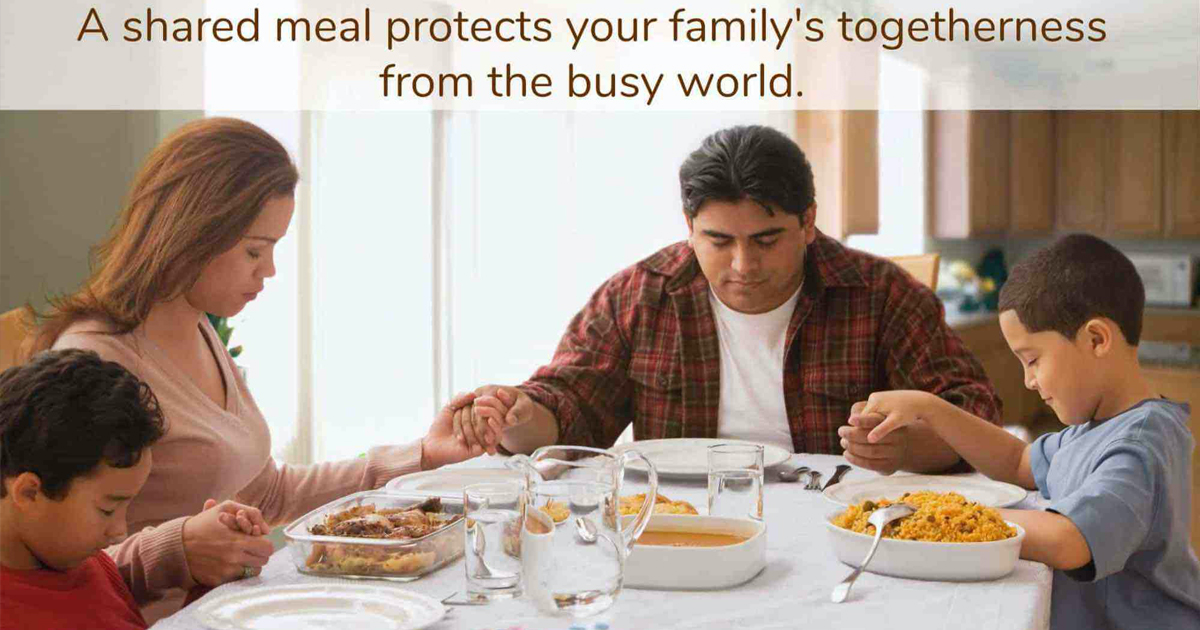In a 24/7 world, connecting as a family is something we all know we should do but can't seem to find the time to do. Between parents' work schedules, sports, dance and homework, many of us live more like roommates than family. Meals are eaten on the road, during practices or while waiting for lessons. Self-help articles in parenting magazines tout the value of family meals and offer creative ideas for types of meals and conversation starters, but what about family dinners for the rest of us?
After all, those magazines don't say what you should do when your children sit down to dinner and become "Savannah-the-Scowling-Teen," "Nora-Not-Gonna-Eat-It" and "Charlie-Hey-Look-What-I'm-Chewing."
So how can I connect with my kids at family mealtimes?
Keep it simple!
The goal is to connect with your children, period. It doesn't matter if you are eating frozen pizza or a gourmet home cooked meal. Find foods that are easy for you to prepare and always have a backup. If one of your kids doesn't like what's being served, let them help themselves to peanut butter and jelly or cereal.
What matters is who is around the table—not what's on it. It doesn't even have to be a meal, just a set time where everyone is in the same space at the same time and talking together.
No screens!
This is one of the hard ones for a lot of families. No phones, no TVs, no hand-held devices can be at the table, and this applies to EVERYONE equally. Don't expect your kids to ignore texts from their friends if you're answering work emails.
Be realistic!
If you have older kids who have rarely had a family meal, this is going to be a challenge. Little kids, of course, have less than desirable table manners. Be flexible with the little ones, and don't be afraid to get a little silly, too—if your four-year-old insists on dipping green beans in ketchup, so be it. With your older kids, be clear about what you are asking for in terms of time commitments and welcome them to invite a friend or two over for dinner every now and then as well.
Stick with it!
Starting a new habit is hard, and you may feel like giving up after the first few attempts. Don't! Your children are worth it, and it will get better. Your teen may act like you are dragging him to prison when you call family to the table, and there will undoubtedly be sibling bickering but these moments when you are all in one place are precious.

Hey, hey, the gang's all here ... Now what?
Once you have your family in one place with food of some type available on the table and the electronics are off, what does a caring parent do in the midst of the deafening silence?
• Tell an embarrassing story about yourself (kid friendly, of course.) We all survived adolescence, had first apartments, cranky teachers or hit the mailbox with grandpa's car. Bring out old pictures of yourself (high school pics seem to go over well). If nothing else happens that day, your kids have discovered you are human.
• Talk with your kids about their activities. You pay for soccer, football, gymnastics, etc. Find out what really happens there. What are they learning? What do they think they are good at? What's the hardest thing?
• Immerse yourself in their world and let them be the teacher for a change. Ask them about their favorite ANYTHING—animal, friend, class at school, video game, app, Netflix series, sports athlete, cartoon character, toy. Immerse yourself in your child's world to learn more about who they are and what they're passionate about. Let your child take on the role of expert and be open and willing to learn from him or her.
• Ask for meal idea help! Kids of all ages are more likely to eat what's on their plate if they had a hand in its planning and/or preparation, so invite them to pitch in on the cooking with you. Assigning weekly themes to your meals is a great way to start—i.e. declare "Meatless Mondays" and serve up bean burritos with rice, grilled cheese and tomato soup or a veggie pasta. Break out tortilla shells and all the favorite toppings for Taco Tuesday! Whip up pancakes, French toast or eggs and call it "Brinner"—breakfast for dinner!
Silence is OK, too.
Sometimes everyone needs time to think and just be together.
So ... what will my kid get out of this? When you take the time to bring family together at the table, your kids learn that:
• You think they're important.
• You enjoy spending time with them and aren't concerned with catching up on work, watching the news, etc.
• You're only human and although meals may occasionally come out overdone and conversation can sometimes lag, the love is always there.
As a therapist, my heart breaks when a child tells me that all her parents do is work or that her parent is always on the phone. A good childhood isn't created by lots of toys, trips to Disney World and team sports. It is created in the small moments of togetherness.
A shared meal is one way to protect your family's togetherness from the busy world.
For more parenting tips from Pine Rest experts, visit the Pine Rest Parenting Blog.
By Rachel Cheyne, Ph.D., Pine Rest Christian Mental Health Services.
Photo courtesy of Pine Rest Christian Mental Health Services.




